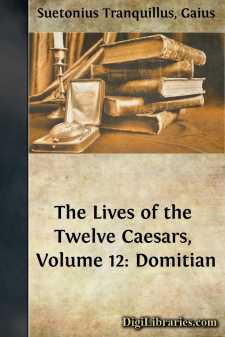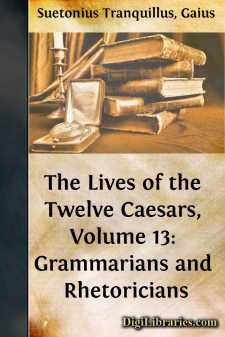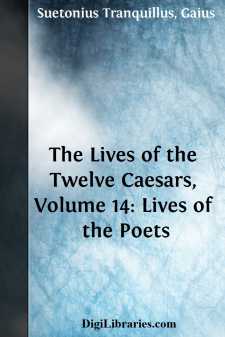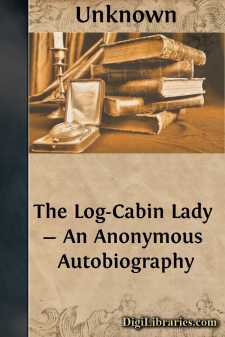Fiction
- Action & Adventure 180
- Biographical 15
- Christian 59
- Classics
- Coming of Age 5
- Contemporary Women 3
- Erotica 8
- Espionage/Intrigue 12
- Fairy Tales, Folklore & Mythology 236
- Family Life 169
- Fantasy 117
- Gay 1
- General 596
- Ghost 32
- Historical 808
- Horror 43
- Humorous 160
- Jewish 25
- Legal 4
- Medical 22
- Mystery & Detective 315
- Political 49
- Psychological 41
- Religious 64
- Romance 159
- Sagas 11
- Science Fiction 730
- Sea Stories 113
- Short Stories (single author) 537
- Sports 10
- Suspense 1
- Technological 8
- Thrillers 2
- Urban Life 31
- Visionary & Metaphysical 1
- War & Military 173
- Westerns 199
Classics Books
Sort by:
TITUS FLAVIUS DOMITIANUS. (479) I. Domitian was born upon the ninth of the calends of November [24th October] [795], when his father was consul elect, (being to enter upon his office the month following,) in the sixth region of the city, at the Pomegranate [796], in the house which he afterwards converted into a temple of the Flavian family. He is said to have spent the time of his youth in so much...
more...
LIVES OF EMINENT GRAMMARIANS (506) I. The science of grammar [842] was in ancient times far from being in vogue at Rome; indeed, it was of little use in a rude state of society, when the people were engaged in constant wars, and had not much time to bestow on the cultivation of the liberal arts [843]. At the outset, its pretensions were very slender, for the earliest men of learning, who were both...
more...
THE LIFE OF TERENCE. Publius Terentius Afer, a native of Carthage, was a slave, at Rome, of the senator Terentius Lucanus, who, struck by his abilities and handsome person, gave him not only a liberal education in his youth, but his freedom when he arrived at years of maturity. Some say that he was a captive taken in war, but this, as Fenestella [925] informs us, could by no means have been the case,...
more...
by:
James De Mille
CHAPTER I. A TERRIBLE SECRET. On a pleasant evening in the month of May, 1840, a group of young ladies might have been seen on the portico of Plympton Terrace, a fashionable boarding-school near Derwentwater. They all moved about with those effusive demonstrations so characteristic of young girls; but on this occasion there was a general hush among them, which evidently arose from some unusual cause....
more...
by:
Andy Adams
CHAPTER I UP THE TRAIL Just why my father moved, at the close of the civil war, from Georgia to Texas, is to this good hour a mystery to me. While we did not exactly belong to the poor whites, we classed with them in poverty, being renters; but I am inclined to think my parents were intellectually superior to that common type of the South. Both were foreign born, my mother being Scotch and my father a...
more...
by:
Unknown
PREFACE The story of The Log-Cabin Lady is one of the annals of America. It is a moving record of the conquest of self-consciousness and fear through mastery of manners and customs. It has been written by one who has not sacrificed the strength and honesty of her pioneer girlhood, but who added to these qualities that graciousness and charm which have given her distinction on two continents. I have...
more...
theRELIGIOUS DENOMINATIONSof london. ‘Homo sum, humani nihil a me alienum puto,’ said Terence, and the sentence has been a motto for man these many years. To the human what deep interest attaches! A splendid landscape soon palls unless it has its hero. We tire of the monotonous prairie till we learn that man, with his hopes and fears, has been there; and the barrenest country becomes dear to...
more...
TROYON'S It must have been Bourke who first said that even if you knew your way about Paris you had to lose it in order to find it to Troyon's. But then Bourke was proud to be Irish. Troyon's occupied a corner in a jungle of side-streets, well withdrawn from the bustle of the adjacent boulevards of St. Germain and St. Michel, and in its day was a restaurant famous with a fame jealously...
more...
THE LONELY DANCER I had no heart to join the dance, I danced it all so long agoвÐâAh! light-winged music out of France, Let other feet glide to and fro,Weaving new patterns of romance For bosoms of new-fallen snow. But leave me thus where I may hear The leafy rustle of the waltz,The shell-like murmur in my ear, The silken whisper fairy-falseOf unseen rainbows circling...
more...
The day is done, and yet we linger here at the window of the private office, alone, in the early evening. Street sounds come surging up to us—the hoarse Voice of the City—a confused blur of noise—clanging trolley-cars, rumbling wagons, and familiar cries—all the varied commotion of the home-going hour when the city's buildings are pouring forth their human tide of laborers into the clogged...
more...











